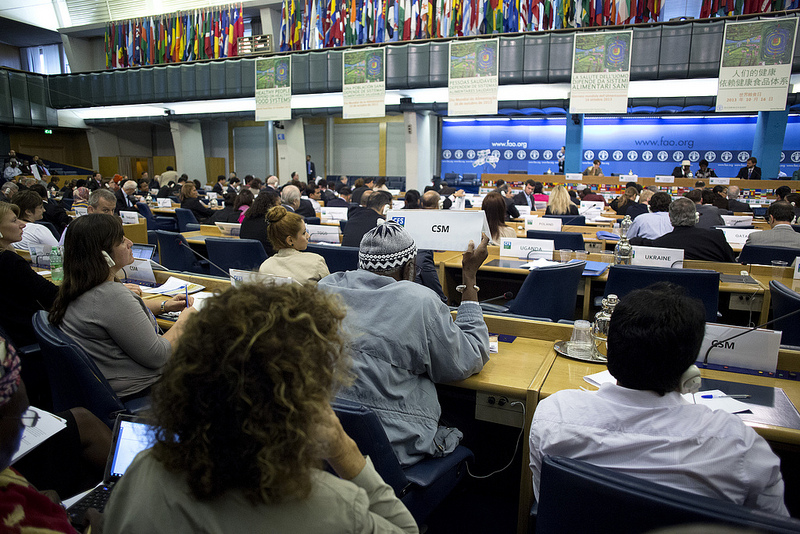By the Civil Society Mechanism for international food security and nutrition

Photo ©FAO/Alessia Pierdomenico
ROME, Italy – Today Civil Society movements blamed Governments negotiating on biofuels at the Committee on World Food security for defending the interests of the biofuels industry rather than the interests of people pushed into hunger by biofuel policies. They refused to endorse the recommendations on biofuels as any references to Human Rights, links with food price spikes and land grabbing have been systematically refused.
Governments acknowledged that biofuels crops compete with food crops and influence food prices but did not have the courage to recommend any action to stop this. The domination of pro biofuel countries in talks has resulted in decisions heavily favorable for biofuels expansion. Governments who spoke expressing strong misgivings have largely been ignored.
“Small scale food producers have spoken powerfully here about the reality they are confronted with every day: that biofuels crops compete with their food production, for the land they till and for the water that sustains them. They called on this assembly to take action to defend the right to food from the impacts of biofuels; instead the recommendations overwhelmingly defend the interests of the biofuels industry and legitimise violations of the right to food.”
In June the High Level Panel of Experts (HLPE), on the request of the CFS, released its report on biofuels policies to inform the negotiations. The report clearly concluded that there is a link between the energy policy and food security and that biofuels have been a key driver behind steep food price spikes and food price volatility in recent years. Other independent research such as by the European Commission has confirmed such findings.
Estimates suggest about six million hectares of land in sub-Saharan Africa is already controlled by European biofuel companies and about 293 land grabs covering more than 17 million hectares worldwide have been reported due to biofuels. On Monday more than 80 civil society organizations sent a letter to CFS members warning that the current recommendations would fail to uphold the Right to Food or stop hunger caused by biofuels.
[1] The CFS serves as a forum in the UN System for review and follow-up of policies concerning world food security. Civil Society participates at the CFS through the largest international mechanism of civil society organizations seeking to influence agriculture, food security and nutrition policies and actions.
[2] The mandate and spirit of the reformed CFS is to create a body that includes all countries and stakeholders. A Global Strategic Framework rooted in the Right to Food is at the heart of the reformed CFS and provides clear guidance to coordinate actions on food security and nutrition. The HLPE provides scientific and knowledge-based analysis to inform governments on priority issues.
[3] Open Letter on Biofuels in the CFS
[4] Civil Society intervention after the CFS Biofuels Decision Box is adopted